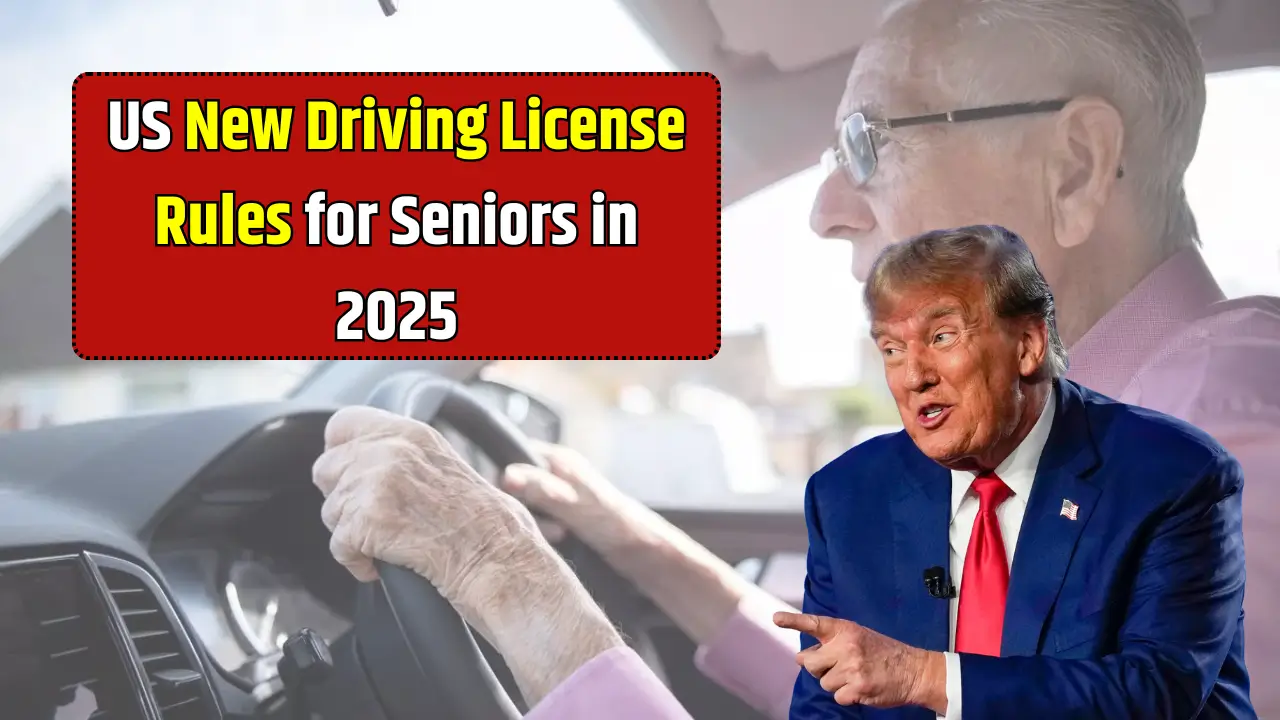U.S. seniors face new driving license rules in 2025, bringing major changes to how older drivers are tested, evaluated, and allowed to keep their driver’s licenses.
Road safety has become a significant concern across the United States, particularly with an ageing population that continues to rely on driving for daily independence.
According to recent transportation data, more than 48 million licensed drivers in the U.S. are aged 65 and above, and their proportion is expected to rise steadily over the coming decade.
The new rules implemented in 2025 aim to balance senior mobility with road safety by introducing medical documentation requirements, vision checks, shorter license validity periods, and in some cases mandatory in‑person testing depending on the state.
These reforms have sparked discussion across communities—while many seniors value independent travel, authorities stress that enhanced checks are necessary to reduce accident risks.
Why New Driving License Rules for Seniors in 2025?
The U.S. has seen a growing number of seniors maintaining active driving licenses, especially as improved health and longer lifespans allow people to remain on the road well into their 70s and 80s.
However, data also shows that senior drivers are at higher risk for accidents due to slower reaction times, poor eyesight, and age‑related health challenges.
The Federal Highway Administration and individual state Departments of Motor Vehicles (DMVs) have responded with updated rules aiming to:
- Improve road safety for all age groups.
- Ensure seniors are medically and mentally fit to drive.
- Reduce traffic fatalities linked to age‑related impairments.
- Provide regular monitoring of driver abilities.
Key Driving License Changes for Seniors in 2025
Although license rules in the U.S. vary by state, the 2025 federal guidelines have encouraged states to adopt stricter rules for drivers aged 65 and older. Below are the primary adjustments:
Vision and Medical Examinations
Many states now mandate periodic vision exams at license renewal for seniors. In some cases, a doctor’s certification of fitness to drive may also be needed for those above 75.
Shorter Renewal Cycles
While younger drivers may renew licenses for 8 years in certain states, seniors are increasingly required to renew every 2 to 4 years. This ensures more frequent testing of eyesight, motor response, and driving ability.
In‑Person Renewals Only
Some states have ended online or mail renewals for seniors beyond a certain age. Instead, seniors must physically visit a DMV office for re‑testing. This allows better evaluation of their condition.
Road and Written Tests for High‑Risk Drivers
If there are concerns about driving ability—such as reports from physicians, police, or family—seniors may be required to undergo a road skills test or written exam before renewing their license.
Conditional or Restricted Licenses
Drivers with health conditions may be granted restricted licenses. These can limit driving at night, restrict highway use, or allow only local area driving to ensure safety.
State‑Wise Overview of Driving License Rules for Seniors (2025)
The table below highlights changes in major U.S. states for senior drivers in 2025:
| State | Renewal Period (Age 65+) | Vision Test Requirement | Road Test Possibility | Online Renewal Available? |
| California | Every 5 years | Mandatory | If flagged by DMV | No, in‑person required |
| Texas | Every 2 years (85+) | Mandatory | Possible, if ordered | Limited availability |
| Florida | Every 6 years (80+) | Vision check required | If reported | No, seniors must visit DMV |
| New York | Every 2 years (70+) | Must pass eye test | Ordered if complaint | Not available for 70+ |
| Illinois | Every 2 years (75-80) & annually (81+) | Vision and road test (81+) | Yes, for 79+ | No for 75+ |
| Arizona | Every 5 years (65+) | Eye exam required | If recommended | Not allowed for 65+ |
This state‑wise approach shows how most states are harmonising with the federal recommendation but tailoring the enforcement to local needs.
Impact on U.S. Senior Citizens
For many seniors, driving is synonymous with freedom and independence. The updated license rules could cause stress since they add more frequent tests and possible restrictions.
However, authorities argue these measures prioritise not only the safety of seniors but also pedestrians, passengers, and fellow drivers.
Some seniors may turn to alternative transport options such as community shuttles, ride‑sharing apps, or family support. Urban areas offer stronger alternatives to driving, but in rural America, where public transport is limited, stricter driving license rules may result in challenges for older citizens.
Responses from Senior Associations and Advocates
Senior advocacy groups have expressed mixed views on the 2025 driving license laws. While acknowledging the need for safety, they have raised concerns about:
- Accessibility of DMV centres for mobility‑restricted seniors.
- Affordability of frequent medical checkups needed for license renewal.
- Risk of age discrimination if seniors face rules stricter than younger drivers with similar medical conditions.
To address these, some states are offering healthcare discounts, extended testing appointments, and programs to assist seniors in transition from driving to public transport alternatives.
Balancing Safety and Independence
Authorities stress that the measures are not intended to take away seniors’ independence but to ensure that senior drivers remain competent on the road.
Initiatives such as refresher driving courses for seniors, state‑sponsored transportation alternatives, and medical fitness allowances are part of this balanced approach.
Practical Guidance for Seniors in 2025
Seniors looking to renew their licenses under the 2025 rules should prepare by:
- Scheduling mandatory vision or health checkups in advance.
- Contacting their local DMV for updated state‑specific age requirements.
- Considering defensive driving refresher courses that may help in test clearance.
- Exploring transportation alternatives in advance to plan for potential restrictions.
Conclusion
The new U.S. senior driving license rules in 2025 reflect the nation’s effort to build safer roads while respecting the needs of an ageing population.
With mandatory medical checks, reduced renewal cycles, and stricter in‑person requirements, the rules aim to strike a balance between independence and safety.
While some seniors will face challenges, proactive planning, awareness, and support from families and communities can ensure that the transition remains manageable.
FAQs
1. At what age do new senior license rules apply in the U.S. in 2025?
Most rules begin at age 65 or 70, though specific requirements such as mandatory road tests can start from 75 or 80 depending on the state.
2. Do seniors need to take road tests every time they renew their license?
No, road tests are only required if there are medical concerns, police referrals, or mandatory age thresholds such as in Illinois (age 81+).
3. Can seniors renew their license online in 2025?
In most states, seniors above 70 or 75 are no longer eligible for online renewals and must go in person to the DMV.
4. What happens if a senior fails a vision or road test?
DMVs may issue restricted licenses, suspend driving temporarily, or revoke privileges until retesting is cleared.
5. Are the 2025 senior driving license rules the same in every state?
No, the framework is nationally recommended, but each state applies its own rules on renewal cycles, vision tests, and age‑based limits.
















